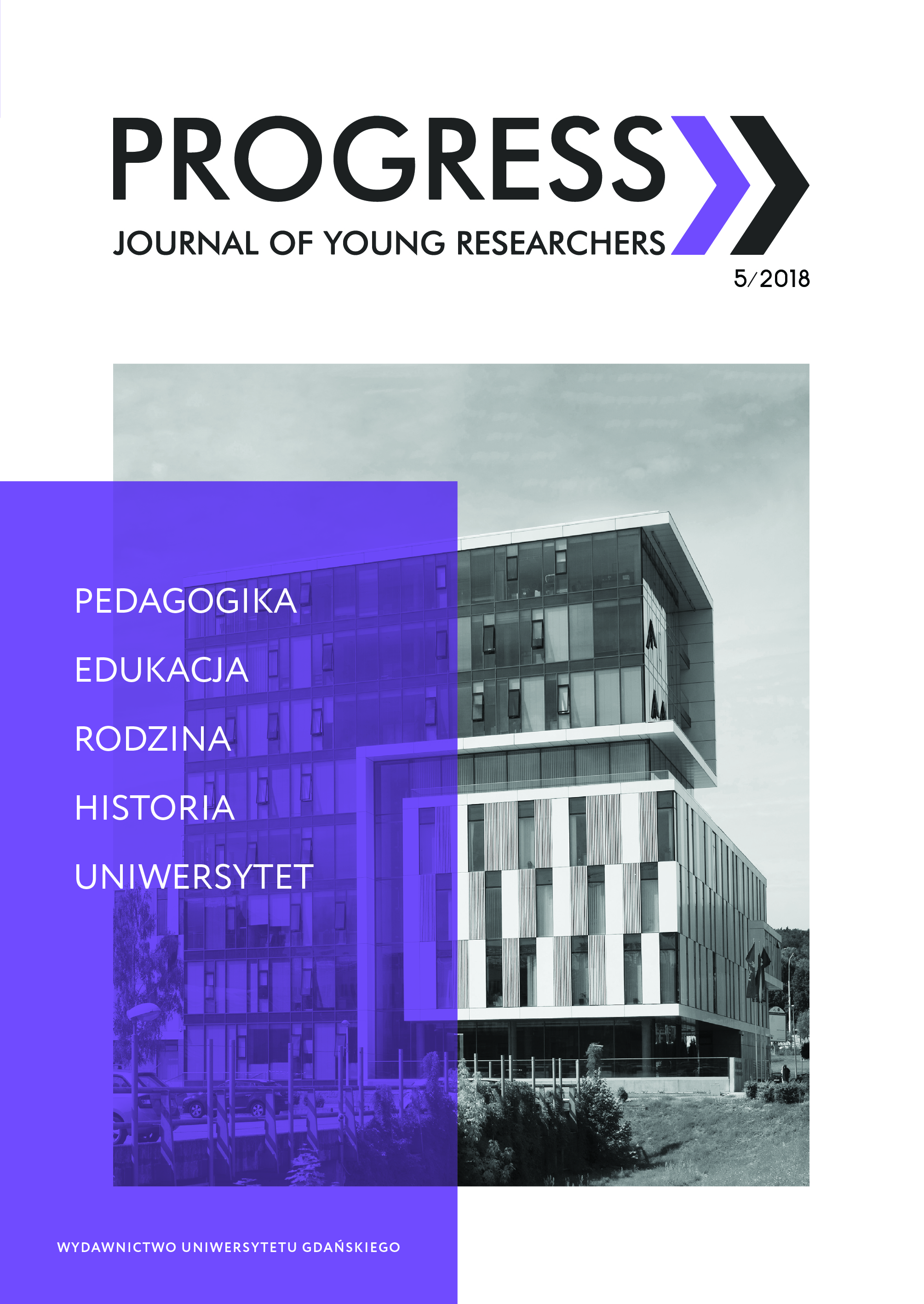Self-awareness through the prism cognitive science and the perspective of autism spectrum
DOI:
https://doi.org/10.26881/prog.2019.5.06Keywords:
autism, selfawareness, cognitive theory, Theory of Mind, TheoryTheory, Theory of SimulationAbstract
One of the problems of modern cognitive sciences is an uncompleted and inconsistent definition of consciousness and self-awareness. It is connected to the interdisciplinary nature of cognitive science, which derives from such fields of science as: neurobiology, cognitive psychology, mind philosophy, linguistics, logic, physics as well as from research on artificial intelligence. Therefore, despite the existence of J. Baars cognitive theory of consciousness, this paper is focused on cognitive processes, that affect the self-consciousness of the individual. In order to create a picture of self-awareness in the cognitive approach, the cognitive mechanisms contained in the theory of mind (ToM) and theories of its development are presented, i.e. the theory of theory (TT), the theory of modularity and the theory of simulation. Self-awareness is increasingly conceived by finding neurophysiological correlates between recognizing conscious stimuli in a given situation and those that the subject is not aware of. The paper attempts to point out the influence of the presented cognitive processes on the self-consciousness of people with autism. The article refers to the literature on the subject of the spectrum of autism as well as to neurological and neurofunctional correlates of autism. Flawed process of mentalization of autistic people was confirmed through research based on neuroimaging. This study is a theoretical concept emerging from the analysis of selected cognitive mechanisms and correlates with previous research on the subject of self-awareness of people with autism. It’s an attempt to draw an outline of the existing ambiguities and open questions regarding the self-awareness of people with the autism spectrum.
Downloads
References
Allen J.G., Fonagy P., Bateman A., 2014, Mentalizowanie w praktyce klinicznej, Kraków.
Attwood T., 2015, Zespół Aspergera – kompletny przewodnik, Gdańsk.
Baron-Cohen S., Howlin P., Hadwin J., 2010, Jak uczyć dzieci z autyzmem czytania umysłu?, Kraków.
Białecka-Pikul, M., 2002, Co dzieci wiedzą o umyśle i myśleniu?, Kraków.
Blakemore S.J., Frith U., 2008, Jak uczy się mózg?, Kraków.
Block B.L., 1999, Osobowościowe uwarunkowania problemów psychospołecznych u osób z uszkodzeniem rdzenia kręgowego, Lublin.
Bobryk J., 1981, Społeczne podstawy Ja podmiotowego, Warszawa.
Carruthers P., 2011, The Opacity of Mind – An Integrative Theory of Self Knowlegde, Oxford.
Cierpiałowska L, Górska D., 2016, Mentalizacja z perspektywy rozwojowej i klinicznej, Poznań.
Dębowski J., 2001, Świadomość – poznanie – naoczność poznania, Lublin.
Efklides A., 2008, Metacognition: Defining Its Facets and Levels of Functioning in Relation to Self-Regulation and Co-regulation, „European Psychologist”, No. 13(4).
Frith U., 2004, Autyzm – wyjaśnienie tajemnicy, Gdańsk.
Goldman A., 2006, Simulating Minds: The Philosophy, Psychology, and Neuroscience of Mindreading, Oxford.
Gut A., 2009, Język a myślenie drugiego rzędu. Analiza testów fałszywego przekonania, „Filozofia Nauki”, nr 17/3.
Gut A., 2011, Samoświadomość, dialog, mowa wewnętrzna oraz inne umysły [w:] P. Oleś, M. Puchalska-Wasyl (red.), Ja- dialogowe, Warszawa.
Hall C.S., Lindzey G., Campbell J.B., 2004, Teorie osobowości, Warszawa.
Howlin P., Baron-Cohen S., Hadwin J., Jak uczyć dzieci z autyzmem czytania umysłu?, Kraków.
Husserl E., 2006, Badania logiczne, Warszawa.
Jackson P., Skirrow P., Hare D.J., 2012, Asperger Through the Looking Glass: An Exploratory Study of Self-Understanging In People with Asperger’s Syndome, „Journal of Autism and Developmental Disorders”, No. 42.
Kanar M., 2018, Samowiedza osób ze spektrum autyzmu w kontekście teorii umysłu, „Ogrody Nauk i Sztuk”, nr 8.
Kozielecki J., 1986, Psychologiczna teoria samowiedzy, Warszawa.
Lau H, Rosenthal D., 2011, Empirical support for higher-order theories of conscious awareness, „Trends Cognitive Science”, No. 15(8).
Maciejczak M., 2007, Świadomość i sens, Warszawa.
Majewicz P., 2002, Obraz samego siebie a zachowanie młodzieży niepełnosprawnej ruchowo, Kraków.
Malicka M., 2002, Bycie sobą jako ideał, Warszawa.
Mądrzycki T., 1996, Osobowość, jako system tworzący i realizujący plany. Nowe podejście, Gdańsk.
McCrae R.R, Costa P.T., 2005, Osobowość dorosłego człowieka, Kraków.
Młynarska, M., 2008, Autyzm w ujęciu psycholingwistycznym. Terapia dyskursywna a teoria umysłu, Wrocław.
Pervin L.A., 2002, Psychologia osobowości, Gdańsk.
Pisula E., 2015, Od badań mózgu do praktyki psychologicznej – Autyzm, Sopot.
Pogodzińska O., Gałkowski T., 2016, Narracje osoby z ASD w autobiografii Temple Grandin [w:] T. Gałkowski (red.), Dziecko autystyczne, t. XXII nr 1, Warszawa.
Rynkiewicz A., 2009, Zespół Aspergera. Inny mózg. Inny umysł, Gdańsk.
Silberman S., 2015, NeuroTribes: The Legacy of Autism and the Future of Neurodiversity, Avery.
Stawecka A., 2014, Obraz siebie. Projekcja twórcza w wytworach plastycznych dzieci przewlekle chorych, Kraków.
Szczepanowski R., 2013, Metapoznawczy model świadomości emocji i empiryczne dowody na jego wykonalność, „Przegląd Filozoficzny”, nr 2.
Szewczuk W., 1975, Psychologia. Zarys podręcznikowy, Warszawa.
Turopolski W., 1999, Koncepcja „Ja” w psychologii Wiliamsa Jamesa [w:] A. Gałdowska (red.), Wybrane zagadnienia z psychologii osobowości, Kraków.
Wojciszke B., 1986, Struktura ja, wartości osobiste i zachowanie, Wrocław.
Vermeulen P., 2013, Autism as Context Blindness, Kansas.
Zaborowski Z., 2002, Człowiek jego świat i życie. Próba integracji, Warszawa.
Zimbardo P.G., Leippe M.R., 1991, Psychologia zmiany postaw i wpływu społecznego, Poznań.
Downloads
Published
How to Cite
Issue
Section
License
Copyright (c) 2019 Author(s)

This work is licensed under a Creative Commons Attribution 4.0 International License.

 Academic Scientific Journals
Academic Scientific Journals




